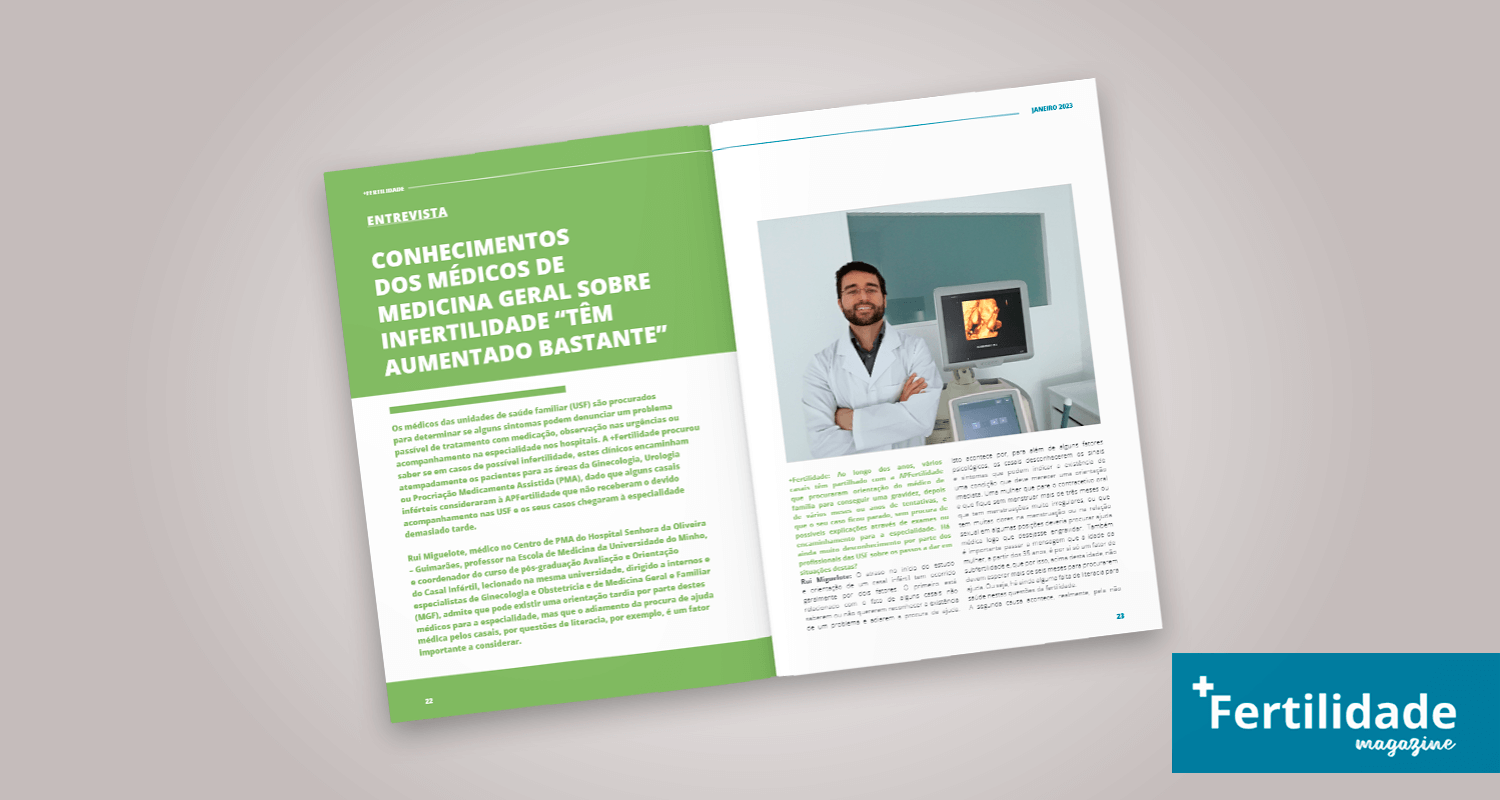
Professor Rui Miguelote in an interview with +Fertility
Professor Rui Miguelote, a doctor on the CETI team, gave an interview to the +Fertilidade Magazine , from the Portuguese Fertility Association , about the importance of referring infertile couples to a specialist consultation in a timely manner.
Be sure to read this highly relevant interview that we share with you here.
General practitioners’ knowledge about infertility “has increased significantly”
Doctors at family health units (USF) are sought out to determine whether certain symptoms may indicate a problem that can be treated with medication, observed in emergency rooms or followed up by specialists in hospitals.
+Fertility sought to find out whether, in cases of possible infertility, these clinicians refer patients to the areas of Gynecology, Urology or Medically Assisted Procreation (PMA) in a timely manner, given that some infertile couples told APFertilidade that they did not receive the necessary support at the USF and their cases reached the specialty too late.
Rui Miguelote, a doctor at the PMA Center at Hospital Senhora da Oliveira – Guimarães, a professor at the School of Medicine at the University of Minho, and coordinator of the postgraduate course Assessment and Guidance of Infertile Couples, taught at the same university, aimed at interns and specialists in Gynecology and Obstetrics and General and Family Medicine (GMF), admits that there may be a late orientation on the part of these doctors towards the specialty, but that the delay in seeking medical help by couples, for literacy issues, for example, is an important factor to consider.
+Fertility: Over the years, several couples have shared with APFertilidade that they sought guidance from their family doctor to achieve pregnancy, after several months or years of trying, and that their case was at a standstill, without seeking possible explanations through tests or referral to a specialist. Is there still a lot of ignorance on the part of USF professionals about the steps to take in situations like these?
Rui Miguelote: The delay in starting the study and guidance of an infertile couple has generally occurred for two reasons. The first is related to the fact that some couples do not know or do not want to recognize the existence of a problem and delay seeking help.
This happens because, in addition to some psychological factors, couples are unaware of the signs and symptoms that may indicate the existence of a condition that requires immediate guidance.
A woman who stops taking oral contraceptives and does not menstruate for more than three months, or who has very irregular menstruation, or who has a lot of pain during menstruation or during sexual intercourse in certain positions should seek medical help as soon as she wants to get pregnant.
It is also important to get the message across that a woman’s age, from the age of 35, is in itself a factor in subfertility and, therefore, women over this age should not wait more than six months to seek help. In other words, there is still a lack of health literacy on these fertility issues.
The second cause actually occurs due to the failure of some general and family medicine doctors or gynecology specialists to identify cases that require early assessment and more differentiated guidance.
Conditions such as endometriosis are still sometimes underdiagnosed or undervalued, the male factor is often only assessed at a more advanced stage of the couple’s study, when it should be assessed at the very beginning, and guidance for some situations of anovulation, namely situations of functional hypothalamic amenorrhea, is provided inappropriately, namely assuming that they are cases of Polycystic Ovary Syndrome.
Fortunately, for both causes, there have been significant improvements, but more can still be done.
+Fertility: Should USFs include the possibility of assessing fertility, informing users about the existence of ways to check if there are problems in advance, as a preventive measure?
Rui Miguelote: In primary care, all signs and symptoms that may indicate pathologies, such as those I described in the previous question, which may compromise future fertility, must be identified and valued in all contacts with users of reproductive age.
For example, a woman who goes to her family doctor because she wants to take an oral contraceptive because she has menstrual irregularities should be told that the contraceptive will resolve her menstrual irregularities, but it will not resolve the ovulatory dysfunction that may be behind these irregularities and that, therefore, when she wants to get pregnant, this condition should be assessed early.
These contacts should also always be used to educate them about lifestyle habits that may compromise their fertility and, in the case of women, the implications of postponing pregnancy.
However, I do not agree with the preventive carrying out of “fertility assessments” on a couple or a user who does not yet wish to become pregnant and who does not have any clinical condition that could compromise their fertility.
These assessments raise several ethical questions and may have significant emotional repercussions. I therefore disagree with the request for spermograms or Anti-Mullerian Hormone measurements for this indication.
These decontextualized assessments of an infertility situation generate concerns and a whole spiral of unnecessary assessments that cause, in my opinion, more harm than good.
+Fertility: In the courses that have been developed under your coordination, what difficulties are expressed by health professionals, including gynecologists and urologists, when faced with potential cases of infertility?
Rui Miguelote: The process of human reproduction and the functioning of the reproductive systems are very complex and, unfortunately, in some aspects still not fully understood.
Although there has been enormous progress, as a result of much research that has been carried out, we still do not have answers for all the situations we encounter and this is very distressing for those who work in this area.
On the other hand, for those who do not deal with this area on a daily basis, it is difficult to keep up with the evolution of knowledge that has occurred and, especially in relation to the study of women, the complexity of the entire endocrine system that is involved often makes it difficult to understand and adequately integrate all the variables that are at play in the different clinical situations that frequently arise.
In the course, we aim to increase knowledge and, above all, the logical understanding of all these processes and the pathological situations that these colleagues most frequently encounter by returning to the understanding of the physiology of the menstrual and ovulatory cycle and the process of fertilization and implantation, and by providing examples with clinical cases.
+Fertility: In addition to these courses, would it be beneficial for USF doctors to take part in training activities in this area, given that they are often the first health professionals asked for help in these matters?
Rui Miguelote: The knowledge of FGM doctors in this area has increased significantly and the improvement in the quality of their services in the study and guidance of these cases is notable, often being at the same level as that of Gynecology colleagues who do not dedicate themselves to this area.
All FGM interns already have a mandatory internship in the area of gynecology/obstetrics and during this internship they usually participate in study consultations with infertile couples. In hospitals that have ART Centers, this internship may be more complete than in other hospitals and it could make sense for FGM interns to spend a short period in these centers.
Attending specific courses in this area, such as the one we organize, is truly an important training opportunity. Over the first few years, we had a growing number of FGM colleagues enrolling in the course, which led us to hold a course specifically aimed at them in 2019, which was very well received.
+Fertility: Another reality that has reached APFertilidade is the late diagnosis of diseases that affect women, such as endometriosis. Symptoms are reported to doctors, but there seems to be some lack of awareness or insensitivity to the fact that intense menstrual pain or the absence of a period, for example, can be indicators of more serious health problems. What advice would you give to professionals who receive cases like these in their practice?
Rui Miguelote: Oligoamenorrhea (absence of menstruation or irregular menstruation) in a woman of childbearing age is always the result of a pathology and therefore deserves study.
Fortunately, in most cases, it is the result of a functional alteration and not an irreversible organic cause. The diagnosis and differential treatment of these conditions is impossible to explain in a few sentences, but I would like to highlight the fact that behind an ovary with polycystic morphology there is not always Polycystic Ovary Syndrome.
In relation to endometriosis, its identification or exclusion is very important in the guidance of an infertile couple and, therefore, the collection of the clinical history, the gynaecological examination, namely in the evaluation of the vaginal fornix and the uterosacral ligaments, and a careful ultrasound with evaluation of the mobility of the ovaries and uterus over the adjacent structures is very important, because we only find what we look for and if an adequate exploration is not carried out, it may escape us.
